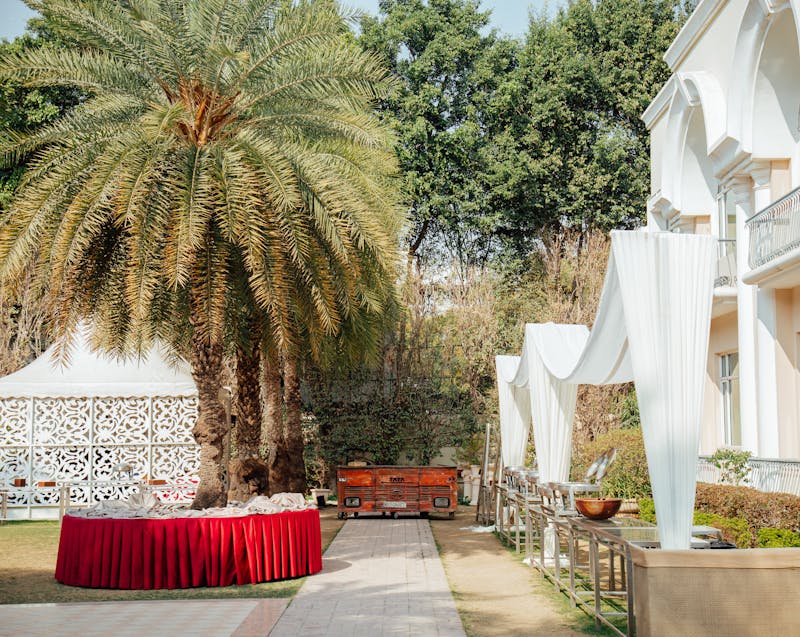
Highlights:
- Historic venues offer unique architectural details and rich cultural stories that modern spaces often lack.
- These spaces create emotional connections, offering both aesthetic value and historical significance.
- Many historic venues have been modernized for comfort and accessibility while maintaining their original character.
- Choosing a historic venue helps support preservation efforts and local heritage.

When planning an event, one of the first and most impactful decisions is choosing the right venue. For many hosts and planners, a space with historic architecture offers more than just a location—it creates an experience. The blend of timeless design, cultural heritage, and atmosphere transforms celebrations into memorable stories. Whether it’s a wedding, gala, or milestone corporate gathering, historic venues deliver a sense of grandeur that modern event spaces rarely replicate.
The Emotional Impact of Historic Spaces
Guests instantly feel the difference when walking into a venue filled with history. The character of centuries-old architecture, intricate craftsmanship, and antique detailing provides an immediate sense of awe. These spaces evoke emotion because they carry the weight of time and storytelling.
Every archway, staircase, and chandelier has witnessed countless moments—each event adding another layer to its legacy. For weddings, this translates into a sense of romance and continuity; for corporate events, it reflects sophistication and distinction. The venue itself becomes part of the event narrative, setting the tone for connection and celebration.
According to Wedding Venue Mavericks, couples and planners increasingly favor venues with historic charm because they “offer built-in ambiance,” reducing the need for extensive decoration. In other words, the architecture becomes the décor.
Architectural Details That Elevate Every Occasion
Historic architecture carries a level of artistry that instantly transforms the mood of an event. From ornate ceilings and vintage woodwork to grand staircases and stained-glass windows, these details provide texture, depth, and beauty.
Each element serves as a natural backdrop, allowing photographers and designers to create visually striking settings with minimal effort. A ballroom framed by marble columns or a courtyard surrounded by stone walls tells a story that can’t be replicated in newer venues.
Guests feel immersed in an environment that blends nostalgia with grandeur. For example, hosting a wedding in a restored Victorian mansion or a corporate dinner in a century-old museum can make the event feel exclusive and elegant without excessive styling.
How Historic Venues Enhance Guest Experience
Event planners know that guest experience goes far beyond the schedule—it’s about how the setting makes people feel. According to Cvent, 80% of planners report that a venue’s atmosphere directly influences attendee engagement and satisfaction.
Historic venues naturally enhance that atmosphere. Their architectural beauty, layered textures, and unique spaces spark curiosity and admiration. Guests often linger to explore, take photos, and connect with one another, drawn by the charm and authenticity of their surroundings.
Moreover, these venues often feature distinctive layouts that encourage flow and interaction—grand foyers for cocktails, libraries for quiet conversation, and expansive gardens for fresh-air mingling. The design itself becomes a tool for storytelling and connection.
Blending History With Modern Amenities
While historic buildings evoke nostalgia, they’re not locked in the past. Many have undergone thoughtful renovations to include contemporary amenities that make events comfortable and seamless. High-speed internet, climate control, and updated lighting systems coexist with preserved facades, parquet floors, and stone fireplaces.
Modernized kitchens and accessible restrooms allow caterers and guests to enjoy convenience without compromising authenticity. These upgrades make historic venues suitable for a wide range of events—from large-scale corporate functions to intimate private gatherings.
The best venues strike a balance between old and new, offering timeless charm with the practicality today’s hosts expect. Event planners appreciate that they can deliver a luxurious experience rooted in history yet equipped for the demands of modern celebrations.
Why Historic Venues Are Ideal for Weddings
For couples seeking a wedding that feels romantic and meaningful, historic venues are a natural choice. The story behind each building adds emotional depth, while the craftsmanship and detail provide stunning photo opportunities.
Ceremonies beneath vaulted ceilings or receptions in century-old ballrooms create an atmosphere of elegance and intimacy. Many couples are drawn to the idea that their love story becomes part of the venue’s legacy—a continuation of the countless joyful moments celebrated there.
Historic venues also offer built-in ambiance that simplifies design decisions. Vintage furnishings, chandeliers, and architectural flourishes often make additional décor unnecessary. The result is a sophisticated aesthetic that feels organic rather than staged.
Corporate Events With Character and Prestige
Corporate clients also benefit from hosting events in historic venues. Whether for product launches, award ceremonies, or networking receptions, these spaces communicate prestige and attention to detail.
Hosting an event in a landmark building or heritage estate reflects a company’s respect for tradition, craftsmanship, and excellence—qualities that align with strong branding. Clients and partners are more likely to remember the experience because the surroundings themselves feel meaningful.
Additionally, the unique setting encourages engagement. Attendees are more inclined to network and participate when they feel inspired by their environment. Historic venues transform standard meetings into memorable gatherings with personality and distinction.
Supporting Preservation Through Event Hosting
One often-overlooked benefit of choosing a historic venue is the contribution to cultural preservation. Event revenue helps fund ongoing maintenance, restoration, and preservation of these architectural treasures.
By hosting weddings, galas, and business functions in these venues, planners and guests help sustain their longevity for future generations. It’s a meaningful way to celebrate while giving back to the community.
Historic venues often collaborate with local historical societies or preservation organizations, meaning every event supports a broader mission to protect the city’s architectural legacy. For many clients, that adds a layer of purpose to their celebration.
Flexibility and Versatility in Historic Settings
Despite their age, many historic venues offer surprising flexibility. From expansive ballrooms to intimate gardens, they can accommodate a variety of event types and sizes.
Some locations allow full customization of layouts and décor, giving planners freedom to merge classic architecture with modern themes. Whether it’s a black-tie gala, a vintage-inspired wedding, or a minimalist corporate luncheon, historic spaces adapt beautifully to different aesthetics.
Their unique character also makes them ideal for themed events. A 1920s Great Gatsby soirée or a Renaissance-inspired celebration feels authentic when set in a venue that naturally aligns with the era.

Photography and Storytelling Opportunities
One of the biggest advantages of hosting events in historic venues is their photogenic appeal. These spaces were designed with symmetry, detail, and craftsmanship that naturally lend themselves to stunning visuals.
Photographers can capture light streaming through arched windows, reflections in antique mirrors, or dramatic shots beneath crystal chandeliers. Every corner becomes a backdrop, turning event photography into art.
Beyond aesthetics, these visuals carry emotional resonance. Guests and hosts alike cherish the story behind the venue—the generations who walked those halls and the memories that continue to unfold there. This depth of meaning transforms photos into lasting keepsakes.
Historic Venues as Cultural Landmarks
Many historic venues hold a special place within their communities. They are often landmarks that reflect a city’s architectural and social evolution. Hosting an event in such a venue connects attendees not just to the celebration but to the history of the region itself.
These spaces frequently showcase local craftsmanship and design traditions—from Gothic Revival churches to Neoclassical courthouses and Art Deco ballrooms. Each style tells a story about the era in which it was built, adding context and depth to the event experience.
Guests leave with a deeper appreciation for both the occasion and the cultural fabric surrounding it.
Creating Lasting Impressions
The goal of every event—whether a wedding, gala, or corporate dinner—is to create lasting memories. Historic venues naturally help achieve that. Their beauty, authenticity, and history resonate long after the final toast.
Guests remember not only what happened but how they felt in that space. The unique ambiance of historic architecture turns ordinary moments into cinematic experiences. That emotional impact is what makes events in these venues truly unforgettable.
In a world where so many gatherings happen in identical, modern spaces, historic venues stand out as one-of-a-kind settings where every corner whispers a story.
Final Thoughts
Choosing a historic venue is more than an aesthetic decision—it’s an investment in experience, emotion, and heritage. From the grandeur of their architecture to the depth of their stories, these venues offer something irreplaceable: authenticity. They provide the perfect backdrop for events that deserve to be remembered for decades to come.
Whether you’re planning a wedding, a corporate gala, or a milestone celebration, consider the magic that historic venues bring. Their timeless charm not only enhances the event but connects everyone who walks through their doors to something far greater—the living history of beauty, craftsmanship, and connection.



